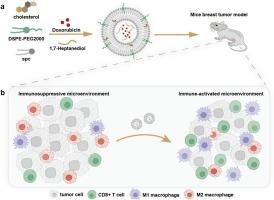当前位置:
X-MOL 学术
›
J. Control. Release
›
论文详情
Our official English website, www.x-mol.net, welcomes your
feedback! (Note: you will need to create a separate account there.)
Synergistic in vivo anticancer effects of 1,7-heptanediol and doxorubicin co-loadedliposomes in highly aggressive breast cancer
Journal of Controlled Release ( IF 10.5 ) Pub Date : 2024-11-19 , DOI: 10.1016/j.jconrel.2024.11.012 Muge Gu, Wei Yu, Sílvio Terra Stefanello, Jiayu Wang, Xiangqi Zhang, Yihui Zhang, Wenkai Zhang, Yuanye Guan, Victor Shahin, Yun Qian, Wei-En Yuan
Journal of Controlled Release ( IF 10.5 ) Pub Date : 2024-11-19 , DOI: 10.1016/j.jconrel.2024.11.012 Muge Gu, Wei Yu, Sílvio Terra Stefanello, Jiayu Wang, Xiangqi Zhang, Yihui Zhang, Wenkai Zhang, Yuanye Guan, Victor Shahin, Yun Qian, Wei-En Yuan

|
Breast cancer holds the highest incidence rate among women. Doxorubicin (DOX) is a potent frontline drug for the treatment of breast cancer. The anticancer mechanisms of DOX include inducing immunogenic cell death in tumor cells, causing damage to tumor DNA, and generating free radicals. However, its pharmacological efficacy and wide use are restricted by its substantial dose-dependent side effects. We have recently revealed that 1,7-Heptanediol (1,7-Hept) severely impairs the bioenergetics and metabolism of aggressive human cancer cells. In the present work, we prepared liposomes co-loaded with DOX and 1,7-Hept (DOX/1,7-Hept-lipo) and assessed their potential synergistic anti-tumor effects. In vitro studies demonstrated that 4T1 cells (the mouse breast cancer cell) exhibited higher sensitivity to 1,7-Hept and DOX/1,7-Hept-lipo could induce ICD of 4T1 cells. Cell viability was markedly reduced when 4T1 cells were treated with a combination of DOX and 1,7-Hept. In a mouse breast cancer model, the DOX/1,7-Hept-lipo exhibited superior anti-tumor efficacy compared to liposomes loaded with individual drugs, resulting in almost total elimination of the tumors at lower doses of DOX with reduced systemic toxicity. Notably, the number of immune cells significantly increased in the tumor microenvironment, and macrophages were more transformed into the anti-tumor M1 phenotype. Our findings suggest strong synergistic anti-tumor effects of DOX and 1,7-Hept, enhancing the efficacy of tumor immunotherapy and mitigating the toxic side effects of DOX.
中文翻译:

1,7-庚二醇和阿霉素共负载脂质体在高度侵袭性乳腺癌中的协同体内抗癌作用
乳腺癌在女性中的发病率最高。阿霉素 (DOX) 是一种有效的治疗乳腺癌的一线药物。DOX 的抗癌机制包括诱导肿瘤细胞中的免疫原性细胞死亡、对肿瘤 DNA 造成损伤和产生自由基。然而,其药理学疗效和广泛使用受到其大量剂量依赖性副作用的限制。我们最近发现 1,7-庚二醇 (1,7-Hept) 严重损害侵袭性人类癌细胞的生物能量和代谢。在本工作中,我们制备了与 DOX 和 1,7-Hept (DOX/1,7-Hept-lipo) 共加载的脂质体,并评估了它们潜在的协同抗肿瘤作用。体外研究表明,4T1 细胞 (小鼠乳腺癌细胞) 对 1,7-Hept 表现出更高的敏感性,DOX/1,7-Hept-lipo 可以诱导 4T1 细胞的 ICD。当 4T1 细胞用 DOX 和 1,7-Hept 的组合处理时,细胞活力显著降低。在小鼠乳腺癌模型中,与载有单个药物的脂质体相比,DOX/1,7-Hept-lipo 表现出卓越的抗肿瘤功效,导致在较低剂量的 DOX 下几乎完全消除肿瘤,全身毒性降低。值得注意的是,肿瘤微环境中免疫细胞的数量显著增加,巨噬细胞更多地转化为抗肿瘤 M1 表型。我们的研究结果表明 DOX 和 1,7-Hept 具有很强的协同抗肿瘤作用,增强了肿瘤免疫疗法的疗效并减轻了 DOX 的毒副作用。
更新日期:2024-11-19
中文翻译:

1,7-庚二醇和阿霉素共负载脂质体在高度侵袭性乳腺癌中的协同体内抗癌作用
乳腺癌在女性中的发病率最高。阿霉素 (DOX) 是一种有效的治疗乳腺癌的一线药物。DOX 的抗癌机制包括诱导肿瘤细胞中的免疫原性细胞死亡、对肿瘤 DNA 造成损伤和产生自由基。然而,其药理学疗效和广泛使用受到其大量剂量依赖性副作用的限制。我们最近发现 1,7-庚二醇 (1,7-Hept) 严重损害侵袭性人类癌细胞的生物能量和代谢。在本工作中,我们制备了与 DOX 和 1,7-Hept (DOX/1,7-Hept-lipo) 共加载的脂质体,并评估了它们潜在的协同抗肿瘤作用。体外研究表明,4T1 细胞 (小鼠乳腺癌细胞) 对 1,7-Hept 表现出更高的敏感性,DOX/1,7-Hept-lipo 可以诱导 4T1 细胞的 ICD。当 4T1 细胞用 DOX 和 1,7-Hept 的组合处理时,细胞活力显著降低。在小鼠乳腺癌模型中,与载有单个药物的脂质体相比,DOX/1,7-Hept-lipo 表现出卓越的抗肿瘤功效,导致在较低剂量的 DOX 下几乎完全消除肿瘤,全身毒性降低。值得注意的是,肿瘤微环境中免疫细胞的数量显著增加,巨噬细胞更多地转化为抗肿瘤 M1 表型。我们的研究结果表明 DOX 和 1,7-Hept 具有很强的协同抗肿瘤作用,增强了肿瘤免疫疗法的疗效并减轻了 DOX 的毒副作用。






























 京公网安备 11010802027423号
京公网安备 11010802027423号